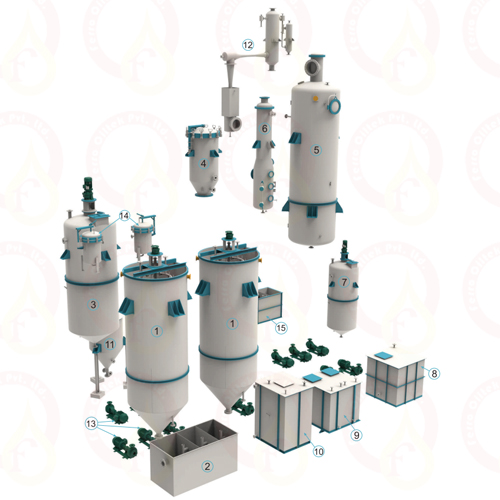
Batch Refining
Batch Refining, as the term suggests, is the process of batch refining capacities below 30 TPD.
Read More
Refining provides characteristics to the edible oil that consumers desire such as bland flavour and odour, clear appearance, light colour, stability to oxidation and suitability for frying, etc.
Refining of crude oil is done to remove unwanted minor components without causing least possible damage to the neutral oil as well as minimum refining loss.
Consequently, to reach the maximum oil quality all the steps of the refining process should be carried out with the minimum losses of desirable compounds.
Degumming is done to remove phospholipids or gums from the crude oil. After addition of hot water (1-3%), most of the phospholipids are hydrated and are insoluble in the oil. The hydrated compounds can be efficiently separated by centrifugal separator.
Depending on the oil composition, the degumming step can be eliminated as the phosphatides are also removed along with the soaps during the next step of neutralization. However, degumming is mandatory for physical refining and the content of phosphorus after degumming should be lower than 10 mg/kg.
Neutralising
In Neutralising section, the oil is treated with caustic soda converting the free fatty acids into insoluble soaps, which can be easily separated by centrifugal separator.
The main objective of neutralisation is the removal of free fatty acids, residual phospholipids in degummed oils or all the phospholipids in the crude oils are also removed as insoluble hydrates. Alkali refining of oil is compulsory in crude oils of high acidity and pigment contents.
The free fatty acid content of the oil is the main factor that determines the amount and concentration of the caustic soda and its excess for a minimum oil loss. After a reaction, the water phase is eliminated by centrifugation and the oil is washed with water to remove the remaining soap.
Bleaching
Bleaching removes the contaminants that adversely impact the appearance of edible oil. This process involves mixing of edible oil with bleaching earth absorbent to remove colour.
Bleaching process looks simply which involves mixing of bleaching earth powder followed by filtration, the physical and chemical reactions that take place in the bleaching process are quite complex. The effectiveness of the bleaching process depends on various factors like temperature, moisture, vacuum, and contact time.
Dewaxing
Waxes are high-melting esters of fatty alcohols and fatty acids with low solubility in oils. Various edible oils contain some wax from the seed shell, which makes the oils cloudy at lower temperatures. The quantity of wax in the crude oils varies from a few hundred ppm. To achieve an oil with sufficient cold stability, the wax content must be reduced to a certain level, and this is done by dewaxing.
Some oils are dewaxed before packing to remove waxes, which are dissolved in the oil. Most of the oils do not need dewaxing as they contain little or no waxes.
Dewaxing is carried out by chilling the oil up to 15-20°C within crystallizers. Chiller device is responsible for the low temperature achievement. The crystallizers designed with agitation mechanism which is controlled by variable drive to have a controlled system and not to break the formed crystals. These generated crystals solids are then filtered by press filter and are removed. The resultant oil gives a sparkling appearance even in winter temperatures.
Deodorising
Deodorising of vegetable oils is to remove odour pigments from the oil. In order to remove these odour pigments, the oil is subjected to high temperature heating under vacuum.
In Deodorization, the stripping process is performed in which the oil is subjected to steam distillation under high temperature and vacuum to evaporate all odour pigments. The resulting deodorized oil is almost tame and tasteless.
Each crude oil kind responds differently to the deodorization parameters. Soybean Oil will differ from Cottonseed Oil. Sunflower Oil will differ from Palm Oil. So is with Groundnut Oil or Rapeseed Oil or Coconut Oil.
NOTE: If the seed is damage or of not Good Quality, then it will affect the quality of oil in refining process.